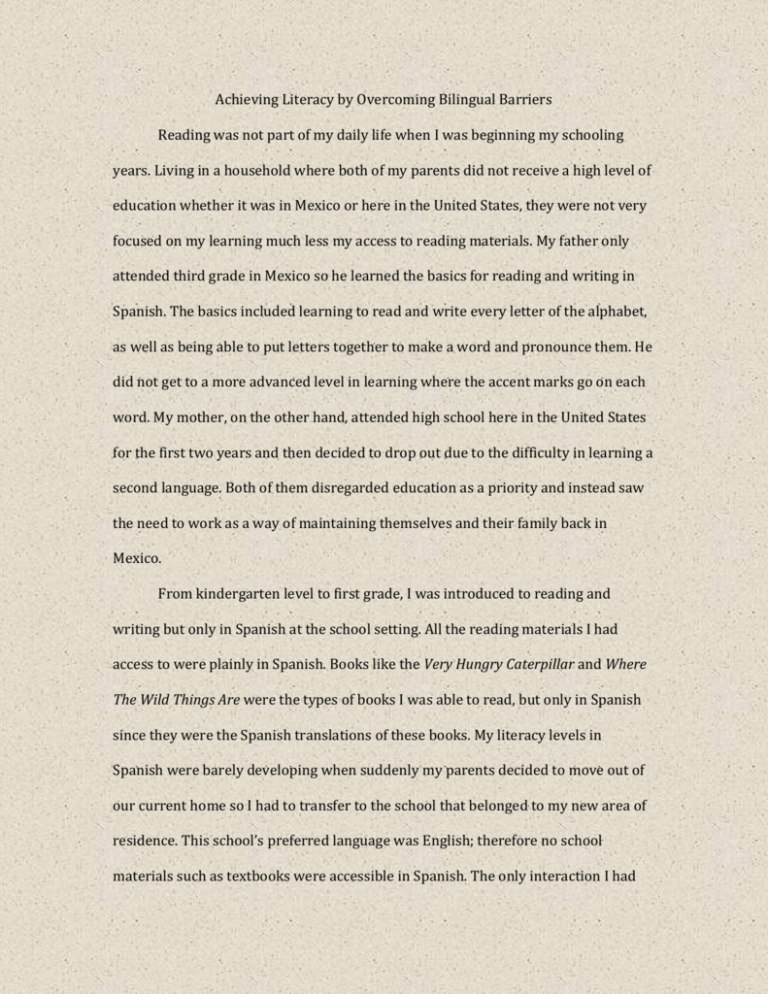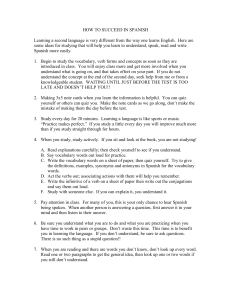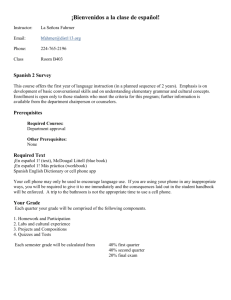Literacy Narrative
advertisement

Achieving Literacy by Overcoming Bilingual Barriers Reading was not part of my daily life when I was beginning my schooling years. Living in a household where both of my parents did not receive a high level of education whether it was in Mexico or here in the United States, they were not very focused on my learning much less my access to reading materials. My father only attended third grade in Mexico so he learned the basics for reading and writing in Spanish. The basics included learning to read and write every letter of the alphabet, as well as being able to put letters together to make a word and pronounce them. He did not get to a more advanced level in learning where the accent marks go on each word. My mother, on the other hand, attended high school here in the United States for the first two years and then decided to drop out due to the difficulty in learning a second language. Both of them disregarded education as a priority and instead saw the need to work as a way of maintaining themselves and their family back in Mexico. From kindergarten level to first grade, I was introduced to reading and writing but only in Spanish at the school setting. All the reading materials I had access to were plainly in Spanish. Books like the Very Hungry Caterpillar and Where The Wild Things Are were the types of books I was able to read, but only in Spanish since they were the Spanish translations of these books. My literacy levels in Spanish were barely developing when suddenly my parents decided to move out of our current home so I had to transfer to the school that belonged to my new area of residence. This school’s preferred language was English; therefore no school materials such as textbooks were accessible in Spanish. The only interaction I had with the Spanish language at this school was speaking to a very few group of students whose native language was Spanish. Entering this new school as a second grader and not knowing a single word in English caused great distress and difficulty on my learning for the first two months or so. I was so accustomed and proud of being able to read a book in Spanish, yet having an English book I was so confused. I felt I had gone back to zero on not being able to read a book but this time in English. The Spanish language itself is very complex and functions in very different ways than English in terms of pronunciation and the way to write it is very distinct also. Therefore, transitioning from a Spanish literacy to an English one disrupted my learning development. For the first two months or so, I tried my best to catch on to the course material and the English language although I was not placed in an English learner class. I had difficulty communicating with my teacher Mrs. Lawn because she did not know a single word in Spanish aside from the basic “hola, adios, si” and “no”. So even through writing it was difficult to let her know what I needed or not. It wasn’t until we began a reading proficiency program, that I began my English literacy. The program’s name I cannot recall but it was a school-wide program that served somewhat as a competition among grade levels, classrooms, and individual students. The way the program worked was we were all given a list of hundreds of books for each grade level beginning with first and ending in fifth grade. Normally, it was ideal to begin with the grade level one was at and see the books under that list to begin reading. Once selecting a book and reading it, each student was sent to a computer and had to take a ten question quiz online based on the book read. At this time, I had never touched a computer in my life so I struggled somewhat in learning how to operate such machinery also. The quiz was multiple choice and we were not allowed to have the book in front of our hands either to check the answers. We had three opportunities to pass the quiz with a 7 or higher, and anything else gave you an automatic fail. Aside from this program being an incentive for students to develop and/or enhance their literacy levels, it was a program that worked as a meritocracy. Each quiz, depending on how well one did and what books were chosen to take the test, would award points. The harder the literacy level required was for the book, the more passing the quiz on that book was worth in terms of points. When each student would reach 25 points, the teacher would give the student a certificate that said they had completed 25 points in the reading program. When a student made it to 50 points, he/she was awarded with a bronze medal. At 75 points, another certificate plus a ticket for an ice-cream would be given. At 100 points (a rare situation), the student would be presented with a silver medal and a ticket for an ice-cream. At 150, the student would get a gold medal. Anyone after 150 points, would receive repetition of medals or something extra be given since not many students were expected to reach more than 150. I had always been a very competitive person so reaching past 150 points became my ultimate goal. When I looked at the list, I was honestly hoping to see some bilingual options for books but unfortunately there were none. All the choices I had were in English and I knew there was a limit of points that we all had to do for the class aside from the possibility of winning some type of award. I remember that instead of going for the books in my second grade level, I decided to start off in first grade. The books were more simplistic in terms of text and served as a guide for me to learn English quicker. I never had any access to books at home so I decided to check out at least three to five books per day, made it my goal to read them, and then take the quiz. After reading my first three books, I went up to the computer and tested my reading ability by taking a quiz. I had one of my fellow classmates teach me how to move the mouse as well as how to take the quiz correctly. With that quick five minute lesson, I was able to take my first quiz successfully. Within three weeks, I was able to go through all the first grade level books and completed its quizzes. I surpassed the minimum requirement by just completing some of the quizzes for the first grade level books but I know I wanted to continue and my goal became to finish off all the second grade level books. Within two weeks or so and still continuing my daily pattern of reading three to five books, I was able to read all of second grade level books and achieved winning the bronze medal. By this time, winning a medal was so inspiring and an amazing feeling since at the time I was only one of four that had gotten to that level. I knew that regardless of how much I could read in English, I was going to push myself towards achieving that goal of winning a gold medal. Second grade level books were not cutting it for me because they were not worth as many points as third and fourth grade level. Therefore, I decided to read a few second grade level books that were the ones that were worth more points than the rest and take the quizzes. Once I was able to pass the quizzes successfully, I moved on to third grade level books and fourth grade level. Fourth grade level books were lengthy novels and were very different from the first and second grade level books I had read. Also, there were very few pictures in these fourth grade level books and I was so accustomed to seeing the images with the text. That is how I even learned how to associate certain images and actions with English terminology. But knowing that my goal was to advance in my reading and at the same time be rewarded allowed me to read constantly and every day. Eventually, English no longer became a barrier. I was able to read, write and speak in English even better than I did in Spanish. Forcing myself to read every day extended my vocabulary and allowed for a way to finally communicate with my teacher and classmates. In addition, I ended up earning two gold medals for making 300 points and the principal decided to take me out to lunch individually. I was the only one in the school to reach that many points and in such little time. I can say that if it was not for the reading program and it giving me an incentive to engage in reading, my literacy would not be the same it is now. First of all, being part of the program encouraged me to open up a book even though it was in another foreign slanguage. I was intimidated to try to read a book in another language rather than my native Spanish because I felt I was going to fail and feel inferior to the rest of my classmates. However, having the choice to start at a lower basic level of reading allowed me to overcome that failure. Also, if it were not for the program, I probably would have suffered with bilingual difficulties throughout the entire year. Lastly, I developed a need to read daily as part of my regular homework schedule outside of class. In addition, I developed computer skills that I never had and I can say it sparked an interest in computing at a very young age. Today, I have a high computer literacy and am pursuing a career in the computing industry.








